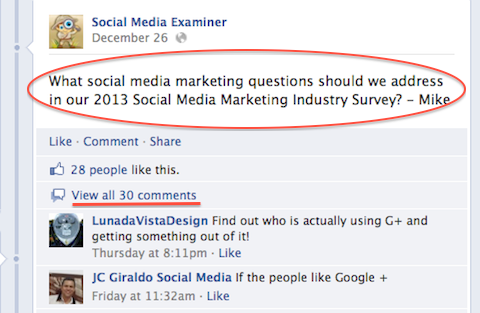 Are you looking to get started with social media marketing?
Are you looking to get started with social media marketing?
Do you want to reexamine how you've been using social networks?
In this post, I'll cover 26 tips, an A-Z guide, to help you understand the backbone of successful social media strategies.
#1: Assess and Reassess
One way to assess whether to use one of the “big four” social networking sites as Samson Lov refers to Facebook, LinkedIn, Twitter and Google+, is by looking at the statistics—number of users on each network.
Statistical data is an interesting factor to look at while you decide where to build presences. However, keep in mind it's one of many perspectives. Some social networking sites may make more sense for your business than others. We'll discuss this further in Tip #19, Start Somewhere and Start Small.
#2: Build a Group of Followers
Austin Considine reveals the “worst-kept secret in the Twittersphere.” He writes:
“That friend who brags about having 1,000, even 100,000, Twitter followers may not have earned them through hard work and social networking; he may have simply bought them on the black market.”
Rome wasn't built in a day and neither are social media followers. Companies should think of followers as something they've earned—the virtual pat on the back.

#3: Curate Content
The question about original content vs. curated content can be a little confusing at times for businesses starting out on social media. Bottom line, you need to do both. A good rule of thumb is the 80-20 rule—use 80% others' content and 20% your own.
Eric Savitz explains,
“As content marketing becomes increasingly central to the overall strategy, marketers look to content curation as a way to help cut through the clutter and provide their prospects with the valuable information for which they are looking.”
#4: Dedication for the Long Haul
The problem that many businesses run into is that they start using social media with lots of good intentions, like someone who has made a New Year's resolution to exercise every day. They have great attendance at the gym in January, and by February are missing in action.
Develop a reasonable, doable plan and stick to it year-round.

#5: Elicit Responses
No one likes to be talked at without being given an opportunity to respond. If you have a blog, let your users communicate and respond to your posts via comments. Ask thought-provoking questions on your other social networking sites that people will genuinely want to respond to.
Get World-Class Marketing Training — All Year Long!
Are you facing doubt, uncertainty, or overwhelm? The Social Media Marketing Society can help.
Each month, you’ll receive training from trusted marketing experts, covering everything from AI to organic social marketing. When you join, you’ll also get immediate access to:
- A library of 100+ marketing trainings
- A community of like-minded marketers
- Monthly online community meetups
- Relevant news and trends updates

#6: Follow Twitter Lists
There are many benefits when you create and follow Twitter lists. Crystal Vogt suggests:
“Twitter lists also allow you to find like-minded followers by perusing others' lists. The Twitter list function can be an important tool for businesses.”

#7: Goals Shouldn't be Hidden
David Meerman Scott writes in his book, The New Rules of Marketing & PR:
“When content effectively drives action, the next step of the sales process—an e-commerce company's Products button, the B2B corporation's White Paper Download form or a nonprofit's Donate link—are easy to find.”
Make your products and services easy to find so users know how to take the next step.

#8: Hometown Perspective
Sometimes it can be confusing to understand the difference between social networking sites. I love Jeffrey Hayzlett’s hometown analogy:
“Think of LinkedIn as a sign that you post on Main Street; Twitter, the view from your front porch as you wave when people go by; and Facebook as the den you use to invite special people to get to know you.”
#9: Industry Contacts + Clients = Users to Follow
Georgina Laidlaw offers a list of mistakes that might be strangling your success with social media and includes one major oversight that I've seen made repeatedly by businesses: Not following or friending industry contacts (and clients, too).
When you follow your contacts and clients, you'll have an opportunity to read their news; see first-hand what content is important to their business; and comment, respond and further your dialogue.
#10: Join the Conversation
By now, the phrase “join the conversation” has been added to the ranks of social media clichés. If your company is able to assign a few people who can regularly represent and speak on behalf of the company via social media, you will find many rewards.
Speaking of conversation, businesses who claim a presence on social networking sites need to have a unique and recognizable voice. We'll talk more about voice in Tip #24, Voice Lessons.
#11: Keyword Research
Caroline and Steve Melberg point out that keyword research is one of the most important parts of the SEO process, “yet few small business owners actually conduct a full and complete keyword research exercise before engaging on their first SEO campaign.”
Caroline and Steve consider keyword research to be essential to help businesses:
- Identify the best and most profitable keywords for their campaigns
- Find missed opportunities that may be profitable for their niche, and conversely, ones that should be scratched from their list
- Identify the focus and direction of their SEO campaign, and ultimately, the core of their online marketing strategy

#12: Location, Location, Location
In one of our earlier 26 Tips articles on the topic of location-based marketing, we referenced Neil Patel’s 8 strategies for local search that provide excellent guidelines to launch local campaigns and are worth repeating here (followed by Tip #13, Market Your Business Locally, with additional thoughts about local listings).
- Keyword research to focus on industry-specific terms and geo-specific terms.
- Optimize your website for local search by adding locally optimized title tags and meta descriptions.
- Create a geo sitemap.
- Have the best Google Places listing possible.
- Build profiles on other sites to build citations for local SEO.
- Get local reviews when you add buttons to your website and encourage reviews.
- Build links from related local businesses and local bloggers.
- Optimize your social pages (Facebook Page, Twitter profile, LinkedIn page, Google+, etc.) for local.
#13: Market Your Business Locally
With the rise of smartphones, tablets and mobile devices, local marketing has become increasingly important for businesses. Sian Simon suggests factors that help to get good local listings:
- Create a profile within the search engines themselves.
- Get listed in local directories (e.g., Superpages, Citysearch), which give you a chance to be displayed more than once in the search engine's results.
- Claim your business listing and create your profile—you can get started with Google, Yahoo! and Bing.
#14: Netiquette and Response Time
Tom Cull offers advice regarding business response time on social media:
“It could be a blog comment, a message through a form on your website or an email straight into your inbox; all potentially as good leads as each other. What the customer wants in each case is a prompt response, which addresses their inquiry and provides a next course of action. If it's a personal blog, email or even social media, then people generally expect a response in 1-2 days.”
Are you responding within 1-2 days to inquiries that you receive via your social networking sites, blog or email? If not, how can you ramp up your response time?

Discover Proven Marketing Strategies and Tips
Want to go even deeper with your marketing? Check out the Social Media Marketing Podcast! Publishing weekly since 2012, the Social Media Marketing Podcast helps you navigate the constantly changing marketing jungle, with expert interviews from marketing pros.
But don’t let the name fool you. This show is about a lot more than just social media marketing. With over 600 episodes and millions of downloads each year, this show has been a trusted source for marketers for well over a decade.

#15: Objectives for Social Media Success
Forrester Research has analyzed hundreds of companies that have successful social media strategies. From their research, they've identified five primary objectives for success:
- Listening—Use social media tools to research and better understand your customers.
- Talking—Use social media to spread your brand and company goals.
- Energizing—Find your “unofficial” leaders and brand enthusiasts and use social media to supercharge the power of their ideas and word of mouth.
- Supporting—Set up social media tools to help your customers support each other.
- Embracing—Integrate your customers into the way you do business and give them an avenue to share product ideas and cost-saving tips. This is the most complex strategy; and one, when implemented well, can demonstrate the greatest ROI.
#16: Patience Is a Virtue for Social Media Marketers
Ilias Chelidonis reminds us,
“Anything that is worthwhile takes time to build, and growing tribes and followers on social networks and creating community takes time. One way to think of it is like building a house ‘one brick at a time.' In the case of social media, it is one piece of content at a time.”
#17: Quick on Your Feet
In Tip #14, we discussed the importance of responding to users' inquiries within 1-2 days. But social media can also be unpredictable. A negative comment can set off a chain reaction, so you need to be quick on your feet to diffuse things before they get any worse.
Nicholas D'Angelo offers the following advice:
“As a brand, or especially as the social media manager of a brand, having negative comments or a ‘brand assassin,' can have a drastic effect on the way your firm is perceived by others. As a brand you have to:
- Be the bigger person
- Seek resolution
- Try to help
- Do everything in your power to turn this ‘brand assassin' to a ‘brand ambassador' and take the higher road.”
#18: Round Robin Your Team's Thoughts
Sometimes, even with all the best intentions, a company doesn't instinctively understand the value that a social network can provide to their business.
Heather Clifford suggests looking to your internal teams for ideas.
“Why not host a social get-together with your team and discuss all the valuable aspects of your company? Do a round robin and allow each person on your team to give their thoughts… Harness the value that is right beneath your own roof. Possibility thinking along with group input is extremely valuable today.”
Confer with members of your team about company messages on social media and see what insights you gain.

#19: Start Somewhere and Start Small
In Tip #1, Assess and Reassess, we discussed social platform decision-making in terms of the size of networks.
Mark Parker offers this piece of sound advice:
“The best place to start is to look at who you want to communicate with, define your typical customer and look at their familiarity with technology and where you are likely to find them.”
He also cautions to not “over-think the interaction… start somewhere, and start small.”
Whether it's one of the “big four” or YouTube, Pinterest, Yelp or one of the other many sites, choose what's most relevant for your business.

#20: Time Allocation
In the fall of 2012, VerticalResponse surveyed 462 businesses with fewer than 100 employees and found that 43% of small businesses are spending at least 6 hours per week on social media.
Finding social media content was reported as taking the most time, followed by learning and education, analyzing efforts, scoping out the competition and responding to questions.
How much time is your business spending on social media? What are the most time-consuming steps?
#21: Update Overload Can Be a Problem
eMarketer reported on a study conducted by SocialVibe that found “one-third of US Internet users who had ended a social connection with a brand did so because the company simply posted too many updates.” Communicate and educate. Don't inundate.
#22: Voice Lessons
What does your business sound like on social media? Are you professional? Friendly? Friendly professional? Serious? Too serious?
Brad Smith recommends that businesses should have a unique voice and personality.
Does your business sound like someone people will want to talk to? Another way of looking at it—would you want to talk to you?
#23: Ways to Capture Different Kinds of Visitors
Darren Rowse suggests catering to two different kinds of blog readers: 1) the hard-won, single visitor and 2) the generic, viral visitor.
For hard-won, single visitors, Darren recommends capturing their attention with things such as:
- Link to further readings on the same topic
- Include signup forms/newsletter subscriptions
- Provide a contact form for questions they might want to ask
- Provide free download targeting their need
- Have active community of commenters or forum members
- Link to social media/RSS subscriptions
For generic, viral visitors, Darren recommends:
- Make comments on posts prominent
- Offer a free download or subscription related to the same content on the same page
- Follow up with the linking site to see if they'll accept a guest post, so you can further build your profile with the site's readers
- Offer the linking site an exclusive piece of quality content (e.g., a white paper or report that links back to your blog)

#24: (E)xplore the Social Media Ecosystem
Danielle Brigida compares the exploration of social media to finding your niche in the natural world—hiking a new trail, observing a stream or other surroundings.
Danielle suggests you use the same tactics for social media exploration:
- Listen
- Ask/document questions
- Experiment
- Create
- Assess and analyze
#25: Yield Deeper Customer Relationships Via Social Networks
Chris Brogan writes:
“If you think of social networks as places where things other than your business happen, then you're starting to get how this all works. People aren't there to find you. They're there for their own purposes. Your job is to have an outpost there and to listen, so that when someone expresses a need you can address, you'll have the ability to start a relationship.”
Are you deepening your customer relationships with social media? What do you need to do differently to make it happen?
#26: Zero Cost of Entry, but Is Social Media Really Free?
Tom Johansmeyer points out that many of the costs associated with social media marketing are not immediately evident. Many of the platforms are free to join and set up a profile, but there are other things to consider:
- The primary issue is content: you need to be able to publish blog posts, tweets and status updates.
- You need to think about content promotion— i.e., getting people know about and read your content.
- There can be public-relations efforts, search engine optimization and community development and management required. This involves more people, more time and more expense.
- As with any marketing activity, measurement is necessary… Google Analytics, Facebook Insights and time with the likes of bit.ly and Topsy, though free, require someone to look at them, crunch the numbers and draw conclusions. Tom asks, “So, is social media marketing really free?” As he says, “Anyone who's made a serious effort to do it knows that there are expenses all over the place. Don't take this as a reason not to hit the social media world to market your company…”

What resonates for you? If your business is getting started or refreshing your social media marketing efforts, what aspects do you need to focus on more intently? Leave your questions and comments in the box below.
Images from iStockPhoto.
Attention Agency Owners, Brand Marketers, and Consultants

Introducing the Marketing Agency Show–our newest podcast designed to explore the struggles of agency marketers.
Join show host and agency owner, Brooke Sellas, as she interviews agency marketers and digs deep into their biggest challenges. Explore topics like navigating rough economic times, leveraging AI, service diversification, client acquisition, and much more.
Just pull up your favorite podcast app, search for Marketing Agency Show and start listening. Or click the button below for more information.

